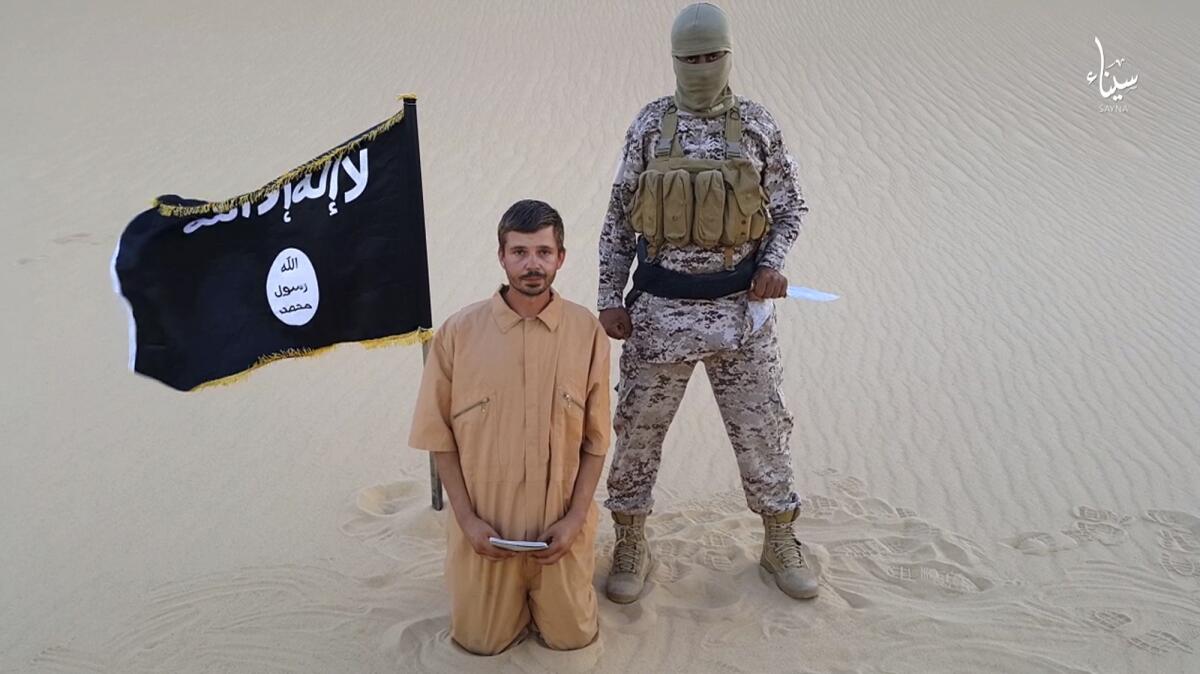Photo appears to show Croatian beheaded by Egypt’s Islamic State affiliate

This image made from a militant video posted on a social media site on Aug. 5 purports to show a militant standing next to another man who identifies himself as Tomislav Salopek.
- Share via
Reporting from Cairo — In what could mark an ominous shift in tactics, the Egyptian affiliate of Islamic State on Wednesday posted a gruesome online image purportedly showing the beheaded body of a Croatian man who was abducted last month on the outskirts of Cairo.
The execution, if verified, would be the first such targeting of a Westerner by Egypt-based militants and would mark a sharp escalation in Islamic State’s self-declared war on the Egyptian government and economic interests.
The still photo, which was posted on Twitter and appeared on jihadist-associated sites, showed a decapitated head placed atop a bloodied torso sprawled in the sand, with a black Islamic State flag flying alongside and a bloodied knife stuck in the sand. The caption accompanying the image identified the slain man as Tomislav Salopek, a Croatian national, and said he was executed “for his country’s participation in the war” against Islamic State.
The Sunni Muslim extremist group has sought in recent months to expand its reach beyond its base in Iraq and Syria, carrying out mass beheadings of Egyptian and Ethiopian Christians in Libya and claiming responsibility for a string of attacks elsewhere, including a gunman’s rampage at a Tunisian beach resort in June that left more than three dozen European tourists dead.
The group’s Egyptian franchise, which calls itself Sinai Province, has previously claimed responsibility for beheadings of accused “spies” in the restive peninsula, but this would be its first known killing of a foreign captive seized on Egyptian soil. Cairo is home to thousands of expatriates, and tourism and multinational companies’ operations are crucial to the still-struggling local economy.
The purported execution came a week after Salopek’s captors released a video in which they threatened to kill him unless the Egyptian government freed jailed female Islamists. Over the last two years, Egyptian authorities have imprisoned thousands of followers of toppled Islamist president Mohamed Morsi and killed hundreds more in street clashes.
The 30-year-old Croat, a married father of two, identified himself in the earlier video as working for an Egypt-based branch of the French company CGG and said in hesitant English that those holding him “want to substitute me” for the imprisoned women, and gave a 48-hour deadline for their release. Ardiseis Egypt, an oil and gas geology firm, had confirmed last week that one of its staff had been abducted.
An Interior Ministry spokesman told the Reuters news agency that the Egyptian government was aware of the execution claim and was seeking to verify it.
Islamic militant groups have been battling Egyptian security forces in the Sinai Peninsula for years, but fighters declaring allegiance to Islamic State have staged some of the deadliest and most effective attacks. Those included a complex assault on Egyptian forces in northern Sinai in July that left 21 troops and more than 100 militants dead, according to Egypt’s military spokesman.
At the time, local news reports, witnesses and security sources put the military toll at up to three times higher than that officially acknowledged, prompting Egyptian authorities to threaten to jail journalists whose accounts of terrorist attacks contradicted official statements.
Egypt’s Islamic State affiliate also claimed responsibility for the assassination in June of prosecutor general Hisham Barakat, who was the highest-ranking civilian official to be killed by the group.
In the aftermath of that strike, President Abdel Fattah Sisi vowed vengeance and hinted that the state might carry out death sentences already handed down against Morsi and hundreds of other members of his Muslim Brotherhood, although the Brotherhood had denied any role in Barakat’s killing or other attacks.
Last week, Sisi presided with great fanfare over the opening of a new channel of the Suez Canal, which Egypt hopes will spearhead an economic revival. Analysts have expressed doubts, however, that the project will meet its ambitious revenue projections.
Egypt’s tourism sector, another economic mainstay, remains fragile in the wake of the 2011 uprising that ousted longtime dictator Hosni Mubarak. Earlier this year, Islamic militants attacked a police post near the Pyramids and set off an explosion outside an iconic temple in Luxor, but no foreign visitors were hurt or killed in those strikes.
Last month, a powerful explosion hit the Italian Consulate in Cairo, seriously damaging the landmark building and killing several passersby, but no diplomats were inside at the time. That was the first attack on a Western mission since Sisi became president.
Twitter: @laurakingLAT
ALSO:
Russia on diplomatic offensive to defeat Islamic State, end Syrian war
More than 200 feared kidnapped by Islamic State in Syria town
Meet two Indonesians who are training to join Islamic State
More to Read
Sign up for Essential California
The most important California stories and recommendations in your inbox every morning.
You may occasionally receive promotional content from the Los Angeles Times.










